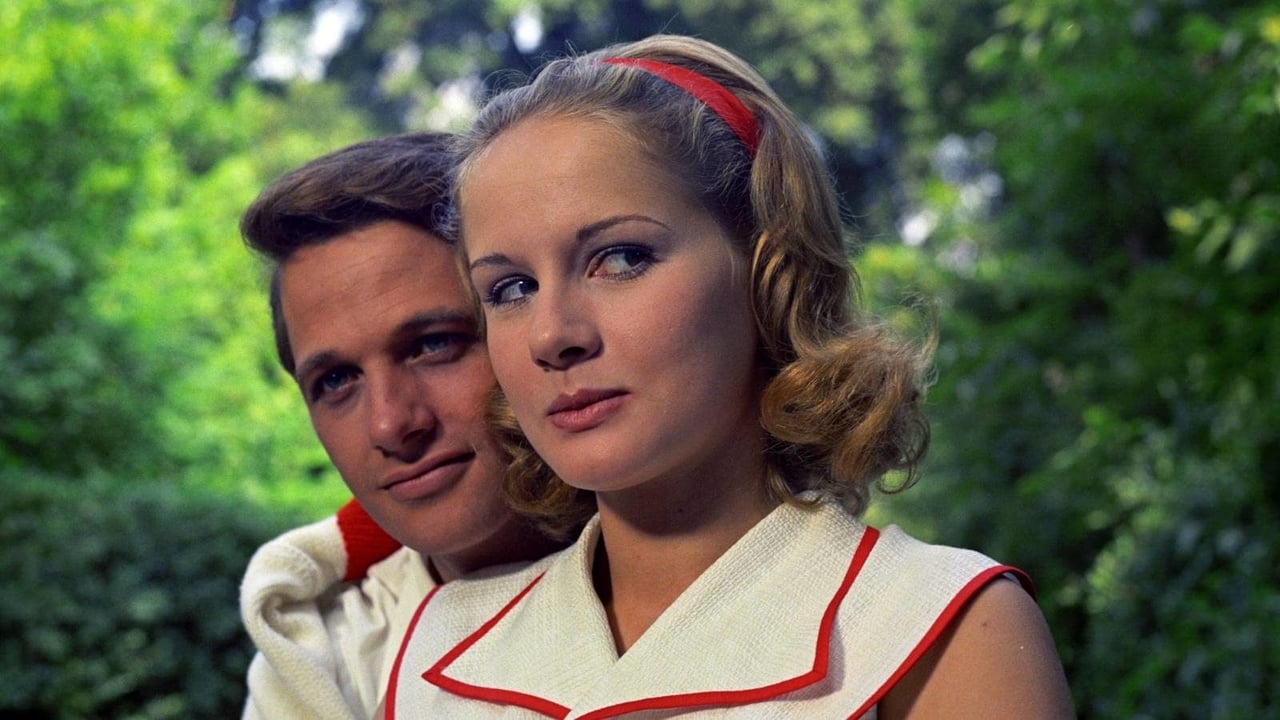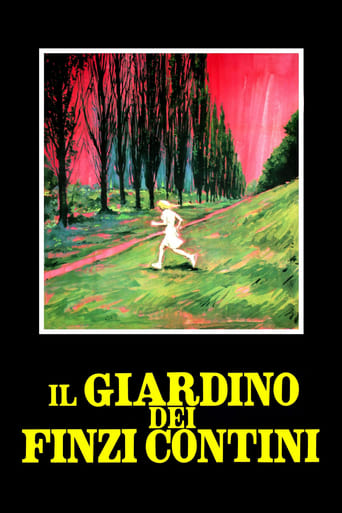



Masterful Cinema
everything you have heard about this movie is true.
View MoreThe film makes a home in your brain and the only cure is to see it again.
View MoreStrong acting helps the film overcome an uncertain premise and create characters that hold our attention absolutely.
View MoreAnother 70s Oscar BEST FOREIGN PICTURE victor, from the versatile Italian actor/director Vittorio De Sica, in fact this is only my second De Sica's film (after MARRIAGE Italian STYLE 1964, 8/10 and disregarding the medley BOCCACCIO '70 1962, 6/10), thus admittedly a major motivating force to watch this one is the star appeal, namely Sanda and Berger. Sanda, whom I recently discovered from Bertolucci's THE CONFORMIST (1970, 9/10), plays Micòl, the young daughter of the aristocratic Jewish Finzi-Contini family in Ferrara in the late 1930s, is the love interest of Giorgio (Capolicchio), from another Jewish but lower-class family, although they have been childhood sweethearts, Giorgio's courtship has yet come off. Meanwhile Micòl's effeminately indisposed brother Alberto (Berger) brings his burly friend Bruno (Testi) to the family and initially Micòl antagonizes him with her affected pomposity, but the ensuing happenings will dish Giorgio's hope and Micòl eventually turns out to be a token victim of the tumult and a failed attempt to dare the purity of Jewish ethnicity. As a war drama of ordinary people being shoved haphazardly by the humanity-defying heinous torrent of rabidness, the movie (maybe also Bassani's source material) obviously don't want to lay bare the ugly truth with pulverizing segments which one can generally assume would happen during the persecution of those Jews (cautiously the film finishes right before that), everything meanders with tepid temperature and sensuous palette, from jovial time on bicycle to the final illusory tennis court flashbacks (the difference between De Sica and Antonioni is immediate), but at any rate, it is wanting a bang to emanate the revelation which is always up in the air, not even the reveal of Micòl's lover with Sanda's bare-chest audacity and soul-searching stare. Like Visconti, De Sica evinces ethereal and superior beauty from his young cast, say no more to knockouts like Sanda and Berger (who is purely existed for his godsend delicacy and impeccable face), even an ordinary-looking Capolicchio and the future action star Testi, have been sculpted meticulously with soft light and fond close-ups. Valli, on the other hand, is prominent as Giorgio's father, illustrates lucidly as a spokesman for an elder generation frustrated by their fate and also impotent to save their children. As a double winner for an Oscar and a Golden Berlin Bear, it doesn't live up to my expectation, maybe it is a common attribute for Italian melodrama, its across-the-board appeal dwindles as time passes by, Visconti's SENSO (1954, 7/10) is too saccharine for my palate and this one is somewhat rather undemanding under the reigns of a maestro like De Sica.
View MoreThe film, to me, is about survival of one's identity. Micol identifies with her childhood and could not let go of it in relation to her childhood sweetheart, Georgio, even while her physical desires develop and intrude. The conflict in her mind is exposed by her enticing Georgio but turning cold when he makes the moves on her. She said she could not breath. Similar to what happened to the Jews of Italy, they were drawn in by their identity. For the Italian Jews, they identified with the Italian civilization, thinking they were a part of it. Georgio identifies with Micol. As the Jews were slowly extracted from theirs, they kept on with those early ideas. Same with Georgio, he kept on with pursuing her. Then finally when he saw she had sex with someone completely different from him and her---and she even turns the light on to show him---he snaps out of it. He finally grasps the physial reality of the situation. The process is just as his father says: better you die (your relationship with Micol, your identity as being part of her world and visa versa) young and hence you have more time to start from zero. And for the Jews: better your notions of being part of the civility of Italian society die early so you have time to rebuild elsewhere.The others in the garden didn't die in time and so became unwilling prisoners, in contrast to their voluntary enprisonment behind the walls of their own estate. Once in prison, Micol finally behaves as a responsible, caring adult, but alas, too late.Prior to that, while in France, Georgio was told of the Nazi horrors and how one man escapes by shedding his identity and saying he has converted to Nazism. Georgio says he won't escape because he had too many ties back in Italy. His identity then was bound to the fantasy of the Jews in the garden, even though his realistic father says they are not his type.Survival of one's identity has been the cause of much suffering when outside, physical, uncontrollable reality intrudes. Unfortunately, the identity we construct in order to feel a sense of belonging which gives us a sense of power, often subtracts from a balanced, caring, and even civilized way. As a result, religious, nationalist conflicts have caused too much suffering to justify the gains offered by these simple-minded (childish?) views.
View MoreMuch like Louis Malle's similarly themed film from 1987 AU REVOIR, LES ENFANTS, Vittorio daSica's THE GARDEN OF THE FINZI-CONTINI's is a meditative piece on the relatively safe haven of a group of people -- in this case, an entire family of wealthy Jews who enjoy a life of privilege as the horrors of World War II and anti-Semitism rages on. The Finzi-Contini's, however, believe that their position of wealth and their very home will shield them from being touched, and they move on, oblivious to the world outside, in a frozen period of time and space that seems, for a moment, to spare them, until it becomes rather clear that the walls that so protected them are beginning to crumble and that they are headed towards an inevitable train wreck which will destroy all that they know. As their rights and the rights of the Jewish people are stripped away from them, they find themselves suddenly awake into a reality they cannot understand, but must move into. DaSica's movie is a slow-moving lyrical poem which differs from his earlier Neo-Realist work, and captures in its running time this illusionary reality as if all this were a dream that the Finzi-Continis were having. The filtered lens only maximizes the almost enchanted beauty that pours through from the screen and onto the viewers' eyes; indeed, this is nostalgia for a time gone by, a trip down memory lane and a subtle incursion into a denouncement of the horrors of war which never rears its ugly head but whose presence ultimately swallows a family, whole.
View MoreIn its own quiet way this Vittorio de Sica gem is as gripping and powerful as such more graphic Holocaust films as "Schindler's List" and "Salo or the 120 Days of Sodom." It deals with a wealthy Italian Jewish family living in a secluded estate in the city of Ferrara. The Finzi-Continis are almost completely assimilated and have little in common with their fellow Jews, but once Mussolini's racial laws begin to take effect they open their gardens to young Jews from the neighborhood. The movie depicts the fatal passivity of people who think they're safe, that monstrous social upheavals won't touch them. Slowly but surely the Jews of Italy have their freedom taken away from them; before they know what's happening they're headed for Auschwitz. The movie leaves the fate of the Finzi-Continis unresolved, but we know from the novel by Giorgio Bassani that none of them survived. This film is beautifully photographed with the visual opulence one has come to expect from Italian cinema, with a haunting score and memorable performances, especially by the ravishing Dominique Sanda, quite possibly the most beautiful woman to ever appear on film. This is a movie everyone should see, since it drives home only too clearly the lesson that freedom can never be taken for granted, that what happened in Nazi Germany or Fascist Italy could happen here too. No one is safe.
View More